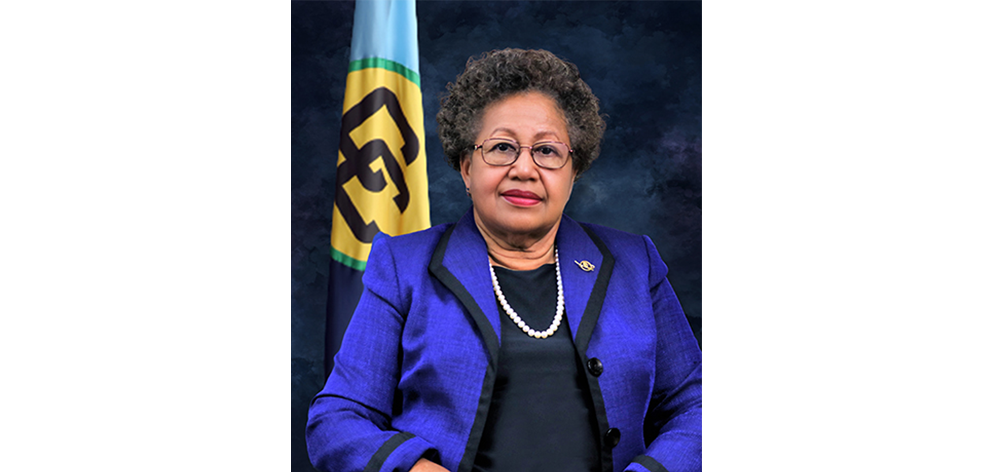Photo: Dr. Carla Barnett, Secretary-General of CARICOM
An alliance of 75 African and Caribbean nations agreed to form the Global Reparations Fund at the four-day Accra Reparations Conference held in mid-November
by Marco Lopez
BELIZE CITY, Wed. Nov. 29, 2023
The push for long overdue compensation for the enslavement of millions of Africans by European powers in the Trans-Atlantic Slave Trade is being accelerated by African and Caribbean nations. On Thursday, November 16, 2023, at the tail end of the Accra Reparations Conference held in Accra, Ghana, 55 nations from the African Union and 20 member-states of CARICOM agreed on the establishment of a Global Reparations Fund.
Delegates at the conference in Accra did not detail how the reparations fund would work, but noted that it should be used to “correct the problems” African and Caribbean countries are facing in all sectors of their economies. The partnership between the African Union and CARICOM marks a historic step in persuading European nations to pay for historical mass crimes and formally apologize.
The creation of the fund is the first step to realizing reparatory justice and righting the wrongs of former colonial powers. It will be championed by a committee of experts and assigned a special envoy, who will engage in campaigns, litigations, and other judicial efforts, according to Amr Aljowailey, adviser to the deputy chairman of the African Union Commission.
Dr. Carla Barnett, Belizean-born Secretary-General of CARICOM, told the conference, “We are at an important inflection point in the global movement for reparatory justice.” She emphasized the importance of speaking “with one voice to advance the call for reparations.”
Ghana’s President Nana Addo Akufo-Addo at the conference said, “It is time for Africa—whose sons and daughters had their freedoms controlled and sold into slavery—to also receive reparations.”
According to a 2023 Brattle Group Report commissioned by the University of West Indies entitled “Reparations for Transatlantic Chattel Slavery (TCS) in the Americas and the Caribbean,” it was found that Britain alone owes a sum of 18.6 trillion pounds for its slaveholding legacy. Along with nations like the US, Portugal, Spain, and France, the total economic toll is thought to be as high as 131 trillion dollars (103 trillion pounds).
“No amount of money can restore the damage caused by the Transatlantic slave trade and its consequences. But surely, this is a matter that the world must confront and can no longer ignore,” President Nana Addo Akufo-Addo said during the conference.
While the calls for monetary reparations continue to mount globally, a full formal apology is a base requirement that many former slaveholding nations refuse to consider.
UK Prime Minister Rishi Sunak is on record in Parliament as replying “no” when asked if he would offer a “full meaningful apology” for the UK’s role in slavery and colonialism. PM Sunak chalked it up to “trying to unpick our history” and said it “is not the right way forward and is not something we will focus our energies on”.
According to the UK’s Guardian, the UK has failed to make a formal apology despite being given numerous public opportunities to do so. King Charles, on a trip to Nairobi last month, acknowledged the unjustifiable violence against the Kenyans during their independence struggle, but fell short of making an apology.
Recently, Germany has officially apologized for the genocide during the occupation of Namibia – announcing financial aid worth more than 940 million pounds. The Dutch Prime Minister, Mark Rutte, in a statement last year offered a formal apology, recognizing the Netherlands’ role in the slave trade as a crime against humanity.
Delegates at the conference cited a growing willingness by European institutions to accept the need to pay reparations. Glasgow University has pledged to pay 20 million pounds to atone for its historical links to the Transatlantic slave trade, and the Church of England has also pledged 100 million pounds, after finding historic links to the transportation of the enslaved in its investment portfolio. Even the descendants of some of Britain’s wealthiest enslavers have formed a group called the Heirs of Slavery, through which they support the call for reparatory justice.
Brattle’s research also highlights the 20-million-pound payment made to British enslavers in 1833 as compensation following the abolition of the slave trade. That amount translates to about 17 billion pounds today – and was footed by a loan from the Bank of England. British taxpayers shouldered the servicing of that loan until 2015 – including many citizens who are descendants of enslaved people.
The report suggests that compensation could be woven into concepts of restitution and rehabilitation in line with the Reparations Commission set up by CARICOM.
Over 12 million Africans were forcefully taken by Europeans and enslaved on plantations between the 16th and 19th centuries. Their labor enriched European states which would turn their eye to exploiting the African continent following the abolition of the slave trade – at which time a scramble for Africa ensued.

